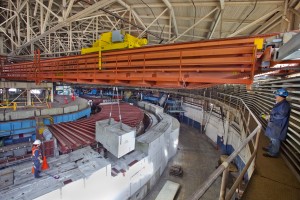Contact: Julie Chao, [email protected], 510-486-6491
As funds from the American Recovery and Reinvestment Act start to flow into Lawrence Berkeley National Laboratory, much of that funding is flowing out to small businesses.
To date, Berkeley Lab has been awarded more than $220 million in Recovery Act funds, a large part of which will go toward infrastructure projects and buying and upgrading computers and scientific equipment, such as microscopes, lasers and gene sequencers. So far, $38.2 million in Recovery Act subcontracts have been awarded, of which 58 percent went to small businesses. That far exceeds the federal government’s goal for the Recovery Act of giving 23 percent of prime contracts to small firms.
In general, the Lab’s goal is to put about half of its procurement dollars into small businesses. “We do what we can to get money into the hands of small businesses,” said Jim Krupnick, Berkeley Lab’s Chief Operating Officer. “These businesses are generally highly responsive to our needs and they are often nearby geographically, which benefits the communities where many of our employees live.”
Added Support Reduces Layoffs
One of the largest subcontracts to receive Recovery Act funding at Berkeley Lab is with Clauss Construction, which falls into one of the federal government’s special subcategories of small businesses as it is owned by a service-disabled veteran. Based in Lakeside, California, outside San Diego, Clauss had been awarded a $24.8 million contract back in July 2008 for demolition of the Bevatron, a massive facility that was once one of the world’s leading particle accelerators. It was a three-year contract, with the second and third year dependent on future funding.

Workers remove shielding blocks at the Bevatron, once one of the world's leading particle accelerators. A subcontract for demolition of the Bevatron, partially funded by the Recovery Act, is with Clauss Construction, a small business owned by a service-disabled veteran. (Photo by Roy Kaltschmidt, Berkeley Lab Public Affairs)
Fortunately for Clauss, the Department of Energy announced in March that the demolition would receive $14.3 million in Recovery Act funding, guaranteeing that the work would continue uninterrupted into the second year of the contract. “Had the Lab not been able to get the funding from DOE, there would’ve been a possibility of laying people off,” said owner Pat Clauss.
Another small business that has benefited from the Recovery Act funding is Crouse Construction, based in Walnut Creek, California. Crouse is working on three infrastructure projects at Berkeley Lab—upgrades of Building 2 (a four-story research building housing scientists from the Chemical Sciences and Materials Sciences divisions), Building 62 (which will consolidate the researchers doing cutting-edge work on next-generation batteries) and Building 66 (which will house research on metamaterials—materials with specially engineered properties at a microscopic level that enable them to out perform their natural abilities). Together, the projects will cost $9.8 million, of which $5.9 million was awarded to Crouse Construction.
“The stimulus money has opened doors for many projects,” said owner Zac Crouse. “It has increased the volume of our business and kept my crew working. I’ve been able to keep people I would’ve had to let go. And as a result of this work, my subcontractors are hiring additional people.” The subcontractors Crouse has hired are largely in the areas of electrical work and plumbing, he added.
In addition, Gwinn Construction of Auburn, California, was awarded $1.1 million to replace aging air handling units at the Advanced Light Source, another Recovery Act-funded project. And even more contracts will be opening to small businesses in the coming months, including $13 million in routers and switches for the Advanced Networking Initiative and various parts for the Advanced Light Source upgrade, such as sextuple magnets (up to $2 million) as well as some machined parts that local small businesses may be eligible for.
Some companies have benefited indirectly. For example, the Laboratory’s electronic commerce suppliers, which are exclusively small businesses, are receiving orders for incidental office and lab supplies needed to support Recovery Act-funded projects.
Longer-Term Economic Impact
Besides creating and saving jobs at Berkeley Lab and its subcontractors and vendors, the injection of funds provided by the Recovery Act is expected to allow advances in many areas of science that otherwise would not have been possible.
“Beyond generating numerous jobs now, many in our surrounding communities, the advanced research that is being funded at Berkeley Lab by the Recovery Act may lead to new companies or even entirely new industries,” said Interim Lab Director Paul Alivisatos. “If we do our jobs well today, we contribute directly to the creation of new high-tech employment in the future.”
Berkeley Lab is a U.S. Department of Energy national laboratory located in Berkeley, California. It conducts unclassified scientific research for DOE’s Office of Science and is managed by the University of California. Visit our website at www.lbl.gov/.
Additional information:
- For general information on procurement at Berkeley Lab, visit www.lbl.gov/Workplace/CFO/pro/index.html.
- For a list of Small Business contracting opportunities, visit www.lbl.gov/Workplace/CFO/pro/small-bus/Small-Bus_Contracting.pdf
- For information about all Recovery Act activities at Berkeley Lab, visit www.lbl.gov/Publications/recovery/.